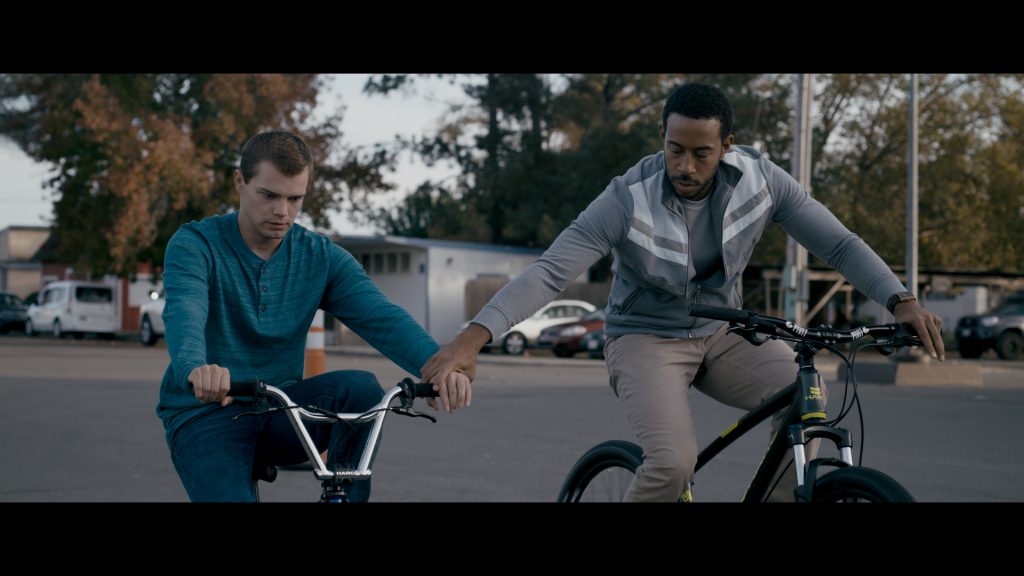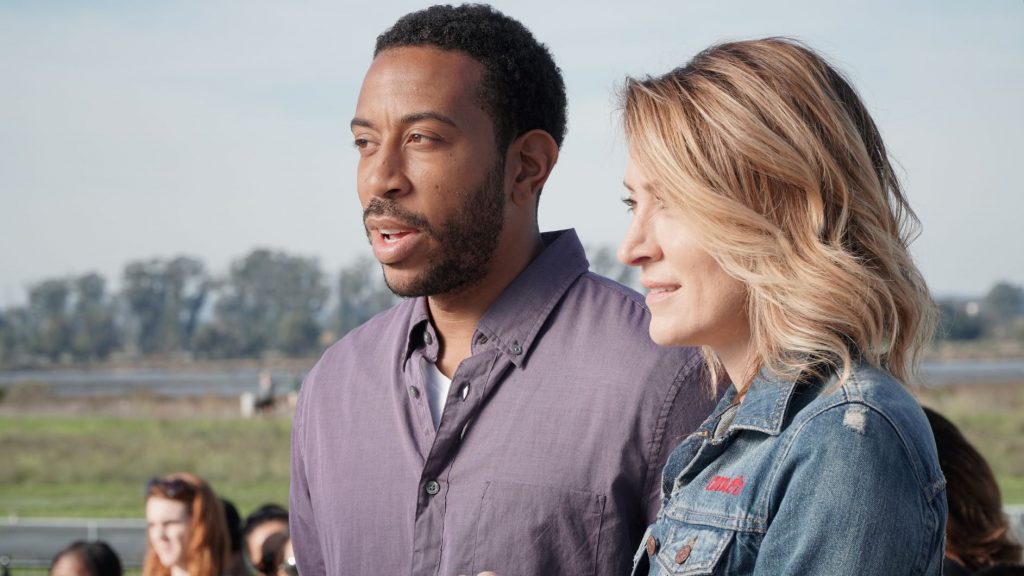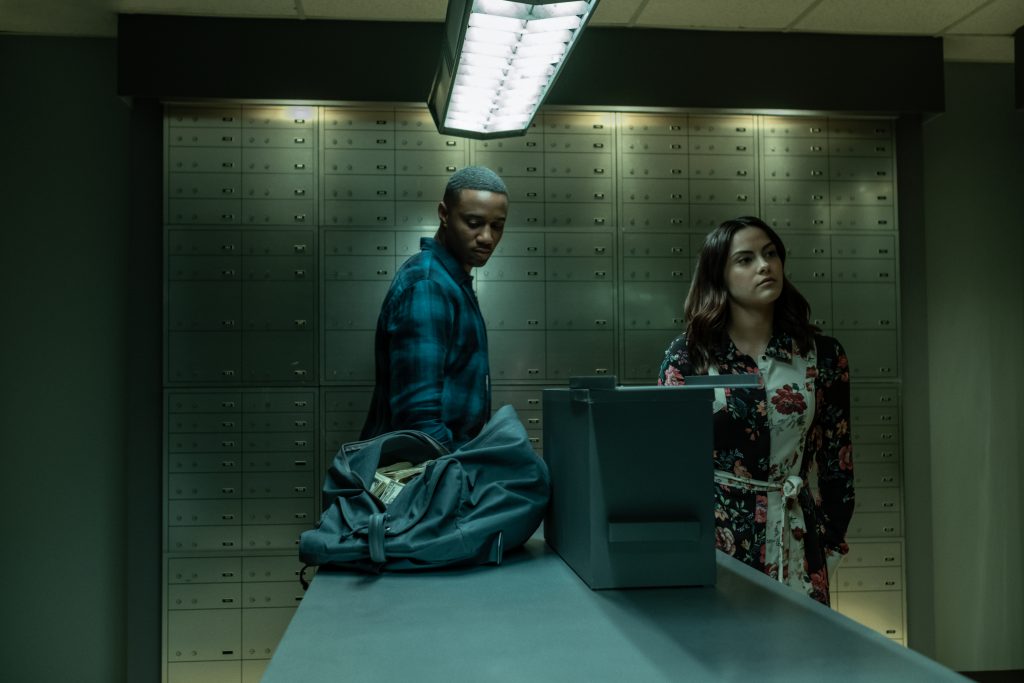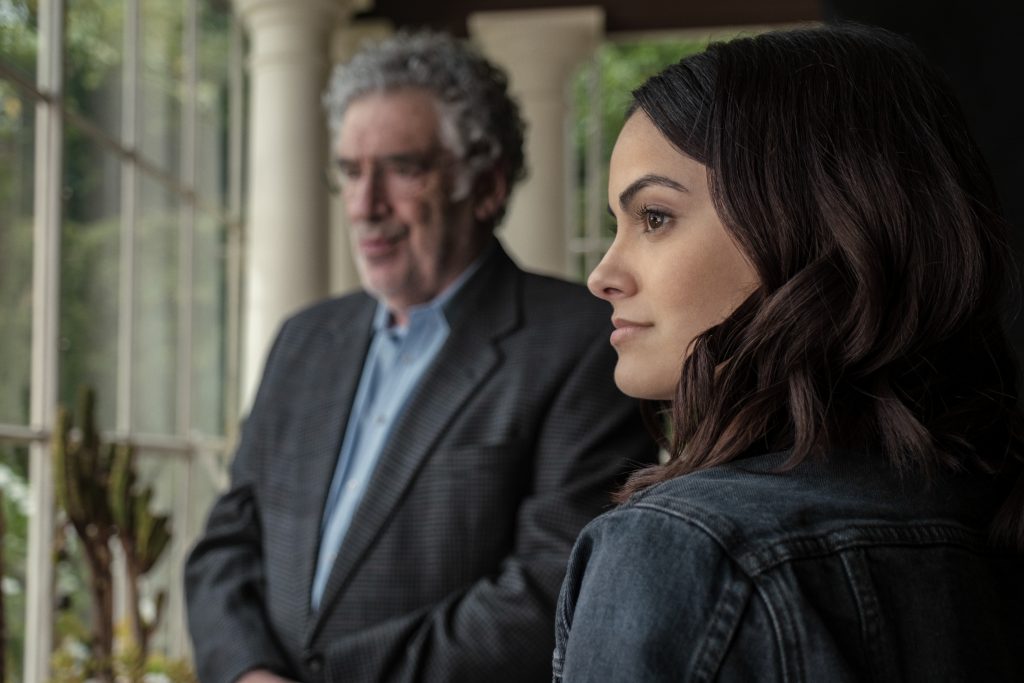March 2, 2024
by Carla Hay
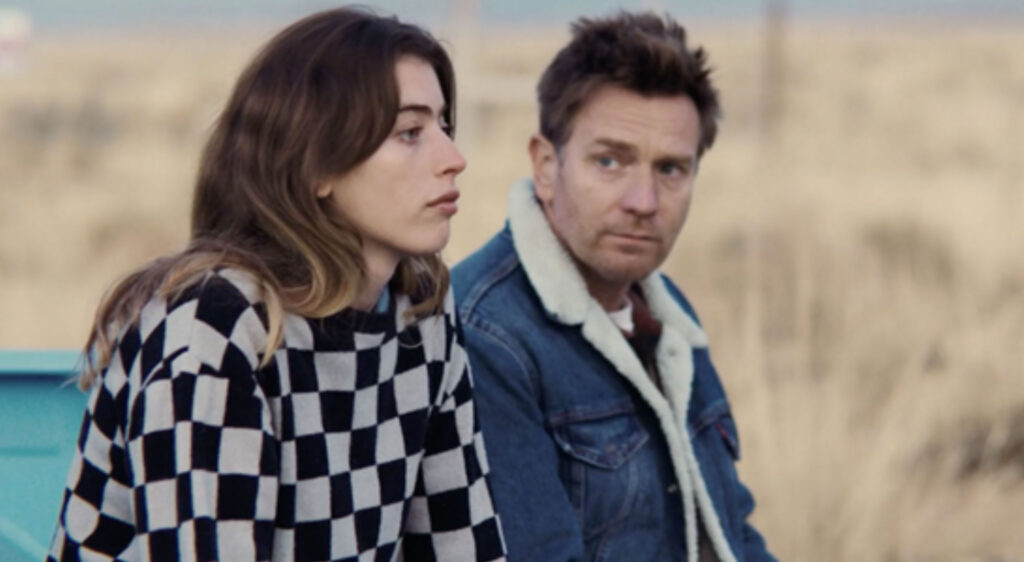
Directed by Emma Westenberg
Culture Representation: Taking place during a road trip from San Diego, California, to Santa Fe, New Mexico, the dramatic film “Bleeding Love” features a predominantly white cast of characters (with some African Americans, Native Americans and Asians) representing the working-class and middle-class.
Culture Clash: A landscaper, who is a recovering alcoholic, takes a road trip with his estranged 20-year-old daughter within a day after she nearly died of a drug overdose.
Culture Audience: “Bleeding Love” will appeal primarily to people who are fans of star Ewan McGregor and movies about families trying to heal from the trauma of drug addiction.

“Bleeding Love” is a movie that can be heart-wrenching and hokey in different parts of the film. Credible performances from real-life father and daughter Ewan McGregor and Clara McGregor carry this uneven road-trip drama during its weaker moments. If you want a more realistic look at how addiction affects families, watch any episode of “Intervention.”
Directed by Emma Westenberg and written by Ruby Caster, “Bleeding Love” had its world premiere at the 2023 SXSW Film & TV Festival. “Bleeding Love” offers some moments of real-life parallels in this story about an alcoholic father trying to mend his fractured relationship with his 20-year-old daughter, who has addiction issues of her own. She is deeply resentful of him because she feels he abandoned her and her mother years ago. The daughter also has bitter feelings because she thinks he cares more about his more recent family, which includes his current wife, with whom he has a son.
Ewan McGregor has gone public about being a recovering alcoholic; he’s said in many interviews that he’s been sober since 2001. He also had a very public split from his first wife Eve Mavrakis, whom he left for his “Fargo” co-star Mary Elizabeth Winstead in 2017. During this messy and prolonged divorce (the divorce became final in 2020), Clara McGregor (his eldest child) went on social media to make insulting and angry comments about her father Ewan. Winstead and Ewan McGregor became parents to son Laurie in 2021 and got married in 2022.
If this movie sounds like it could be like real-life family therapy, it looks that way, up until a point. In “Bleeding Love,” Ewan McGregor and Clara McGregor portray a father and a daughter who do not have names in the movie, although the daughter’s nickname is Turbo. It’s a nickname that the father gave to her in her childhood. She doesn’t want to called Turbo anymore, because it reminds her of happier times when she and her father used to be close. The movie has several flashbacks to the daughter’s childhood (Devyn McDowell portrays the daughter at about 8 or 9 years old), showing mostly loving moments between her and her father.
It’s revealed near the beginning of the film that this father owns a small landscaping business called Highland Lawn & Landscape, which has a truck that he’s driving for this road trip from San Diego, California, to Santa Fe, New Mexico. Much of their trip is through remote desert locations. The daughter is reluctantly going on this trip with him. Her mother is never seen or heard in the movie, although there’s a scene where the daughter calls her on the phone.
Less than 24 hours before this road trip, the daughter had nearly died from a drug overdose. She’s a talented painter who has given up on painting, much to the dismay of her father, who thinks she shouldn’t be wasting this talent. He says he’s taking her to Santa Fe to “hang out for a few days” with an acquaintance who is an artist because the father says he hopes it will inspire the daughter to start painting again. It soon becomes pretty obvious that there’s more to this trip than just a casual visit to an artist.
The daughter seems to know it too, because within the first 10 minutes of the movie, she tries to run away on a deserted road after getting out of the truck to squat on the side of the road to urinate. The father runs after her and catches up to her, and they continue on the trip, where they often bicker and have personality clashes. “You’re pretty out of shape,” she sneers at him after their short chase in the desert. He replies, “I can never keep up with you.”
After stopping at a convenience store to get something to eat, the father offers her a bite of his meat sandwich. She dismissively says, “I’m vegan.” The father asks, “Since when?” She replies, “Since I was 15.” Throughout the road trip, the daughter repeatedly tries to sneak drinks of alcohol without her father knowing. She also denies that she has any addiction problems.
After their truck breaks down (a road-trip cliché), a talkative and eccentric tow-truck driver named Elsie (played by Kim Zimmer) takes them to a trailer-park area so that her friend Amos (played by Willie Runsabove, also known as Willard Runsabove) can fix the truck. While waiting for the truck to get fixed, the daughter strikes up a flirtation with a graffiti artist named Kip (played by Jake Weary), who’s dressed as a clown for an outdoor kids’ party taking place in the trailer park. When the daughter goes back to Kip’s place, they start drinking alcohol, until the father bursts in and pulls her away after scolding Kip for giving alcohol to his under-21 daughter.
The daughter also steals mini-bottles of liquor at a convenience store. Later, at a diner, when her father is outside making a phone call, the daughter drinks a half-full glass of wine that was left behind by another customer. Considering her recent drug overdose, it should come as no surprise that it isn’t long before the daughter begins craving something stronger than alcohol. It leads to her meeting two strangers named Eli (played by Travis Hammer) and Michelle (played by Sasha Alexander), who are a couple.
The father shows a range of emotions when interacting with his daughter. He is stern, compassionate, remorseful and frustrated. She is usually angry, petulant, rebellious, playful and stubborn when interacting with her father. They both have areas of vulnerability and weaknesses that are exposed to each other during this trip. The movie shows rather than tells that this father and daughter are more alike than the daughter wants to admit.
Some of the emotions in “Bleeding Love” are raw and very authentic-looking. One of the movie’s best scenes is an argument between the father and the daughter in a motel room. However, there are other moments that are downright corny. Viewers find out why the movie is called “Bleeding Love”: There’s a scene where the father and daughter have a bonding moment when they start to sing Leona Lewis’ 2007 hit “Bleeding Love” together while driving in the truck. (Ewan and Clara McGregor also sing a duet in the movie’s closing-credits song: a cover version of the Alessi Brothers’ 1976 hit “Seabird.”)
Other times, this movie seems to exist just to show all the unusual characters the father and daughter meet on this road trip. After one of her many frequent stops to urinate on the side of a road, the daughter gets a burning sensation in her vagina while they’re driving at night. The father thinks it might be an animal bite, so he frantically drives around to find a drugstore that’s open.
It’s during this search that the father and daughter meet a sex worker named Tommy (played by Vera Bulder), who’s hanging outside a closed drugstore. It leads to a scene that looks very contrived for a movie, but the acting in the scene is good enough to overcome some of the screenplay flaws for this scene. Bulder’s screen time in the movie is less than 15 minutes, but she makes her wayward character a memorable and vibrant presence in an occasionally dull movie.
It would be easy to assume that Ewan McGregor and Clara McGregor didn’t have to do much acting to channel the turbulent father/daughter relationship that’s depicted in “Bleeding Love.” However, re-enacting whatever problems they had in real life (they have since reconciled after the divorce turmoil in their family) is a lot harder than most people might think it is. “Bleeding Love” is at its best when it captures authentic nuances in parent/child relationships rather than creating hackneyed scenarios for the sake of filling up time in a movie drama.
Vertical released “Bleeding Love” in select U.S. cinemas, digital and VOD on February 16, 2024.

